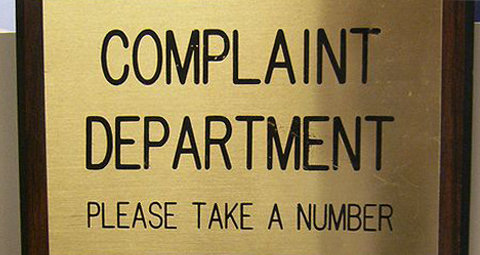June 22 | ![]() 0 COMMENTS
0 COMMENTS ![]() print
print

Shocking treatment of service workers is evidence of a depersonalised, corroded society
‘We are to serve even as we are being served—even and especially when we are served poorly,’ writes Brandon McGinley
We are called to imitate the Christ who ‘came not to be served but to serve.’ It’s not too hard to imagine what that looks like among family and friends: It’s the kind of reciprocal service that springs from authentic love.
But what about when the relationship is fleeting and one-way? That is, what about those times when we are necessarily the recipient of service, whether in a restaurant, a shop or a train station?
This may seem like a trivial concern, but I think it’s more important than we realise. The social dynamic between a customer and a service worker is so institutionalised that it’s easy for us to fall into established roles because ‘that’s just the way things are.’
But, especially as our culture devolves increasingly rapidly into decadence, it is exactly the things that we take for granted that we should examine most closely to determine if they are actually corroding our sanctity.
In this case, I think the prevailing assumption about the relationship between customers and service workers—that we are to expect the latter to act as a kind of very temporary servant—is one of those examples of hidden corrosion.
We’ve been told for generations that ‘the customer is always right,’ and so we know at some level that even if the faceless corporation this worker represents is infinitely more powerful than we are, between us and this individual person, in most cases, we hold all the cards.
We’ve all experienced it: the miserable store patron who berates a clerk for a minor misstep; the acquaintance who invariably complains about service even after a sumptuous meal; the righteous crusader who gets a positive thrill from uttering the words: “I’d like to speak to a manager.” (During a bad day, week or month, we might be any of these people.)
All of these actions and attitudes spring forth from the same source: “I deserve to be treated better.”
But the problem is: we don’t. Jesus, the God-man, came to live among us and was spat upon and beaten and tortured and murdered. We, the sinners He came to save, don’t ‘deserve’ a timely refill of our skinny latte or a satisfactory answer to our question about the broadband bill—especially from workers who are likely underpaid and overworked as it is.
Just because it’s someone else’s job to serve me doesn’t mean it’s my job to be served. The Christian duty to be a servant doesn’t end when we enter a shop or restaurant or when we call customer service. We are to serve even as we are being served—even and especially when we are served poorly.
In practice, this could mean any number of things: tipping generously regardless of the quality of service (it’s not your job to ‘discipline’ the staff); tidying up your space after a meal to make it easier for the clean-up staff; not lashing out (this is the hardest one) at a difficult customer service representative who is likely constrained, on pain of losing his or her job, from being as helpful as you would like.
But most importantly, it means cultivating an ethic of solidarity in our own hearts—one that sees the service worker not as a means to an end nor as an impediment to be removed, but as a partner in a common project.
In the moment, that common project might be as simple as efficiently paying for my milk and eggs so that the next person can be served. In view of eternity, though, that common project is each other’s salvation: treating the other as a bearer of God’s image and thus, even if only in tiniest quantum imaginable, communicating God’s grace and bringing that person closer to Him.
To the extent that this sounds naive or even stupid, it’s a problem with our society, not with the idea of solidarity. If we can’t imagine treating a service worker like a full human being, it’s because we’ve built a depersonalised society—one where each individual is used and discarded as ‘the economy’ or other powers-that-be require.
This ethic is so pervasive that it now feels totally natural, but it is actually the negation of our nature. We can dissent in small but meaningful ways by serving the servants with gestures of kindness and solidarity, which can be as simple as a smile and a genuine ‘thank you.’ If these don’t spark a revolution in our society, maybe they will in a soul.











